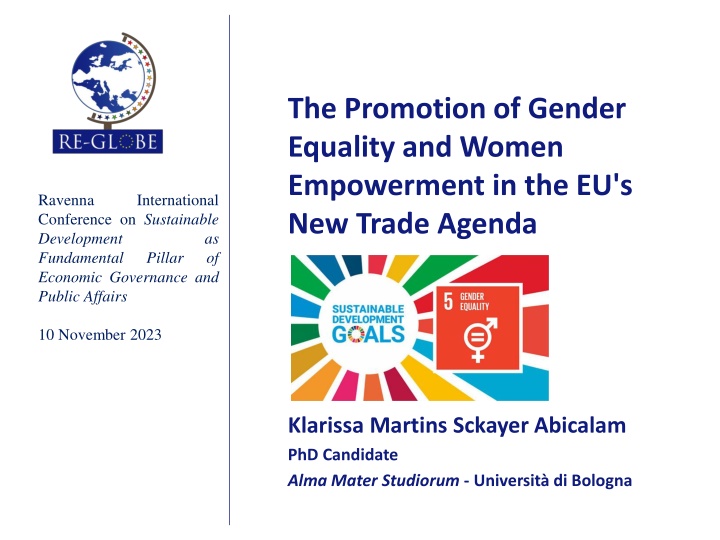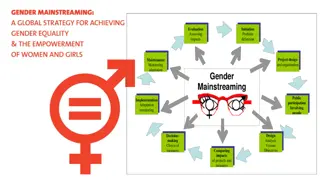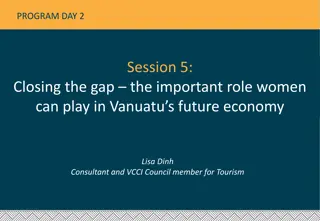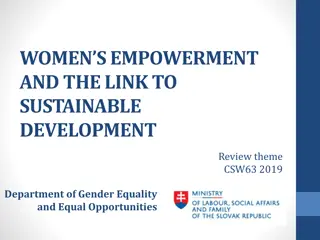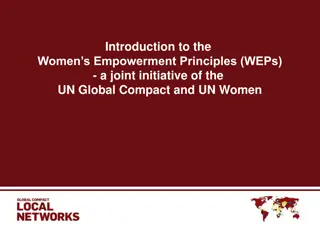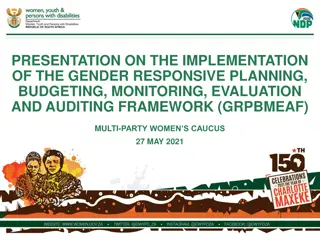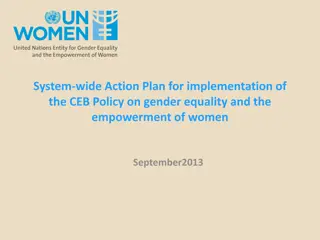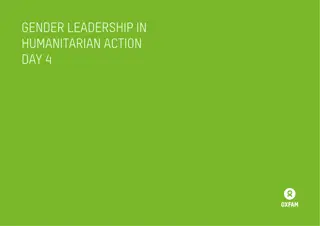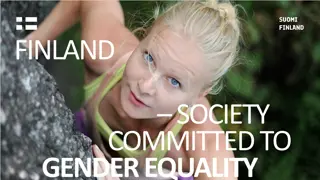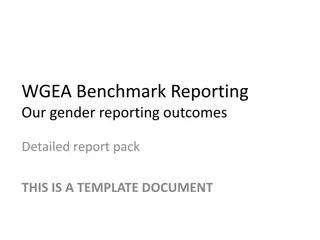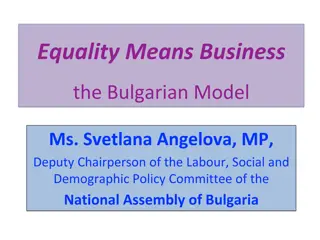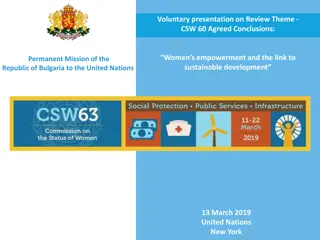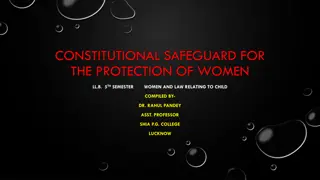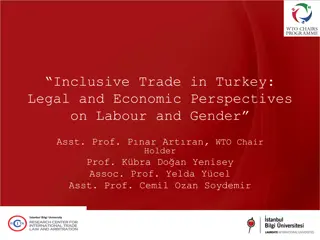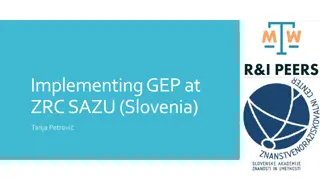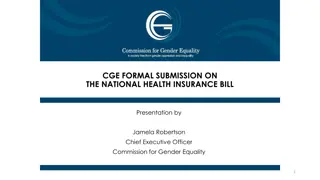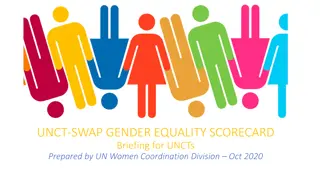Promotion of Gender Equality and Women Empowerment in EU's New Trade Agenda
This content delves into gender-explicit provisions in the EU's trade agreements, highlighting efforts to advance gender equality and empower women. It explores specific articles, commitments, and cooperation activities aimed at promoting women's participation, leadership, and education in trade-related aspects. The negotiations with New Zealand and Chile, concluded in 2022, are also detailed, emphasizing provisions related to gender equality and cooperation activities for women in various sectors.
Download Presentation

Please find below an Image/Link to download the presentation.
The content on the website is provided AS IS for your information and personal use only. It may not be sold, licensed, or shared on other websites without obtaining consent from the author.If you encounter any issues during the download, it is possible that the publisher has removed the file from their server.
You are allowed to download the files provided on this website for personal or commercial use, subject to the condition that they are used lawfully. All files are the property of their respective owners.
The content on the website is provided AS IS for your information and personal use only. It may not be sold, licensed, or shared on other websites without obtaining consent from the author.
E N D
Presentation Transcript
The Promotion of Gender Equality and Women Empowerment in the EU's New Trade Agenda Ravenna Conference on Sustainable Development Fundamental Economic Governance and Public Affairs International as of Pillar 10 November 2023 Klarissa Martins Sckayer Abicalam PhD Candidate Alma Mater Studiorum - Universit di Bologna
Gender-explicit provisions in the new generation of EU FTAs South Korea [2011 (provisionally), 2015 (fully)] CETA [2017 (provisionally)] Japan [2019] Singapore [2019] Vietnam [2020] United Kingdom [since 2021] EU-South Korea Art. 13.4.2 recognising full and productive employment and decent work for all as a key element of sustainable development for all countries and as a priority objective of international cooperation and to promoting the development of international trade in a way that is conducive to full and productive employment and decent work for all, including men, women and young people. Annex 13: ( ) cooperation on trade-related aspects of the ILO Decent Work Agenda, including on the interlinkages between trade and full and productive employment, labour market adjustment, core labour standards, labour statistics, human resources development and life-long learning, social protection and social inclusion, social dialogue and gender equality.
EU-New Zealand (negotiations concluded in June 2022) Specific article on Trade and Gender Equality (19.4) inside the TSD Chapter that includes: - General provisions recognizing the need to advance the 5thSDG and WTO Buenos Aires Declaration. - International Commitments with the CEDAW and the ILO Conventions related to gender equality and the elimination of discrimination in respect of employment and occupation. - Cooperation Activities on trade-related aspects of gender equality including activities for women workers, businesswomen and entrepreneurs: promotion of women's participation, leadership and education, as STEMs and e-commerce; Promotion of financial inclusion, financial literacy and access to trade finance and education. - Right to regulate on gender equality (19.4.5) - TSD Committee - entitled to monitor the implementation of the TSD Chapter. - TSD chapter subject to the main DSM, but excluded from the possibility of temporary measures in the event of non-compliance with the Panel's report.
EU-Chile (negotiations concluded in December 2022) - Specific stand-alone chapter on Trade and Gender Equality (Chapter 27) - General provisions reaffirming commitments with the 5thSDG, WTO Buenos Aires Declaration and Beijing Declaration and Platform of Action. - International Commitments with the CEDAW and the ILO Conventions related to gender equality and the elimination of discrimination in respect of employment and occupation. - specific clause to not weaken or reduce the protection granted under their respective laws aimed at ensuring gender equality or equal opportunities for women and men in order to encourage trade or investment. ( the parties shall not ) - Cooperation Activities on trade-related aspects of gender equality including activities for women mothers, workers, businesswomen and entrepreneurs: promotion of women's participation, leadership and education, as STEAMs and e-commerce; Promotion of financial inclusion, financial literacy and access to trade finance and education (more extensive list when compared with the EU-New Zealand). - Right to regulate. Each Party shall strive to improve law and policies on gender equality, - DSM of the TSD chapter >Panel of Experts ->Recommendations - TSD Committee - entitled to monitor the implementation of the TSD Chapter.
EU-Kenia (negotiations concluded in June 2023) Specific article on Trade and Gender Equality (Art. 4 ) inside the TSD Chapter (Annex 5) that includes: - General provisions recognizing the need to advance the 5thSDG and WTO Buenos Aires Declaration. - International Commitments with the CEDAW and the ILO Conventions related to gender equality and the elimination of discrimination in respect of employment and occupation. - No detailed cooperation activities: designed to improve the capacity and conditions for women, including workers, businesswomen and entrepreneurs, to access and benefit from the opportunities created by this Agreement. - Right to regulate: Each Party shall strive to improve such law and policies, without prejudice to the right of each Party to establish its own scope and levels of protection for equal opportunities for men and women. - TSD chapter fully subject to the main DSM, and so the gender-related provisions are not excluded from the possibility of temporary measures in the event of non-compliance with the Panel's report.
Current Challenges: - Uniformization commitments in gender-equality and women s rights; of gender-related provisions and international - Define a model of DSM to solve conflicts arising from gender-related provisions to prevent protectionism and unequal treatment among trading partners; - Define mechanism to foster cooperation to effectively promote women s empowerment, boosting trade liberalization for a more inclusive, fair, sustainable international trade that leaves no women behind.
Thank you very much for your attention! Klarissa Martins Sckayer Abicalam University of Bologna Email: klarissa.martins2@unibo.it
